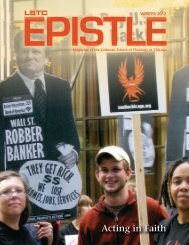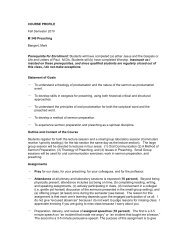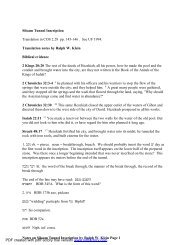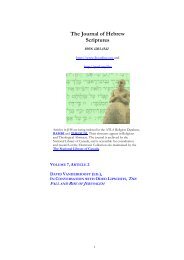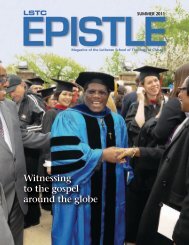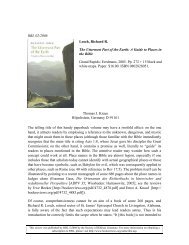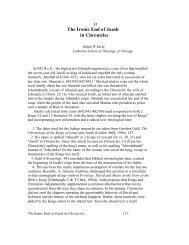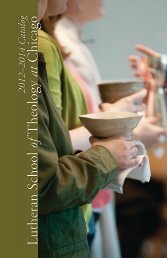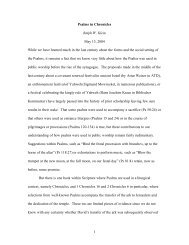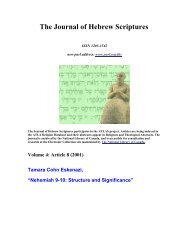Metacommentating Amos* Metacommentary, what is that ... - Fontes
Metacommentating Amos* Metacommentary, what is that ... - Fontes
Metacommentating Amos* Metacommentary, what is that ... - Fontes
Create successful ePaper yourself
Turn your PDF publications into a flip-book with our unique Google optimized e-Paper software.
4. <strong>Metacommentating</strong> Amos 5denly become a sin, as well as a social d<strong>is</strong>ease? 6 Drinking wineout of bowls instead of cups does admittedly sound greedy, andanointing yourself with the finest (and presumably most expensive)oil rather than bargain basement value-for-money oil <strong>is</strong> certainlyself-indulgent. But how serious <strong>is</strong> self-indulgence? Is it acrime? Is it a sin <strong>that</strong> deserves a sentence of deportation? Doesbeing wealthy and conspicuously consuming renewable naturalresources (wine, oil, mutton and elephant tusks) put you in linefor exile, by any reasonable standards? What are the rich supposedto have been doing? If expensive oil <strong>is</strong> on sale in the marketand you have the money in your pocket to buy it, where <strong>is</strong>the sin?Ah well, say the commentators, it’s more serious than <strong>that</strong>. Theprophetic critic<strong>is</strong>m <strong>is</strong> <strong>that</strong> these people have been indulgingthemselves and at the same time not feeling any pain at the ruin oftheir people (6.7). So, says the metacommentator, if they hadbeen worried about the fate of the nation, it would have been allright for them to be self-indulgent? Well, no, not quite. Actually,they are being hit on both counts. Anyway, says themetacommentator, how does the prophet know <strong>that</strong> they do notfeel pain about their nation? He <strong>is</strong> presumably not invited totheir parties—surely he wouldn’t have the nerve to complainabout the extravagance if he were—so how does he know <strong>what</strong>they feel and don’t feel? Ah well, it’s obvious <strong>that</strong> if they felt anypain they wouldn’t be having parties. Is it? If Rome really <strong>is</strong>burning, <strong>what</strong> else <strong>is</strong> there left to do except fiddle?Would it perhaps be just as true to say, Amos hates the richbecause he <strong>is</strong> not one of them? If he were richer, he would beusing more expensive aftershave himself. It’s easy to condemnother people’s lifestyle and to blame the ills of society on them.But the truth about political and economic d<strong>is</strong>aster and wellbeing<strong>is</strong> probably far too complex to be explained by thebehaviour of individuals. The fate of nations <strong>is</strong> determined muchmore by structural matters, the operation of markets, demographicchanges, d<strong>is</strong>ease, war and chance. To be sure, the personalbehaviour of other people <strong>is</strong> not a negligible factor in everyday6 . The commentators think <strong>that</strong> the phrase ‘like David’ <strong>is</strong> an inauthenticaddition to the text; but they would say <strong>that</strong>, wouldn’t they, because otherw<strong>is</strong>eit would be altogether too hard to say <strong>what</strong> was wrong with it.



